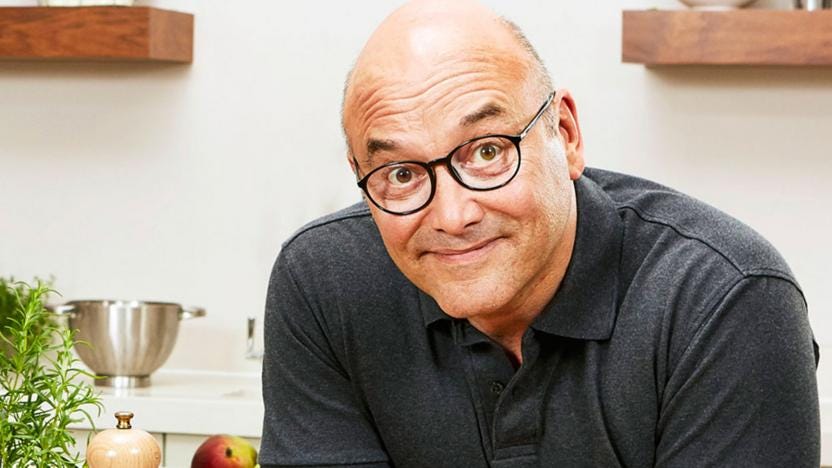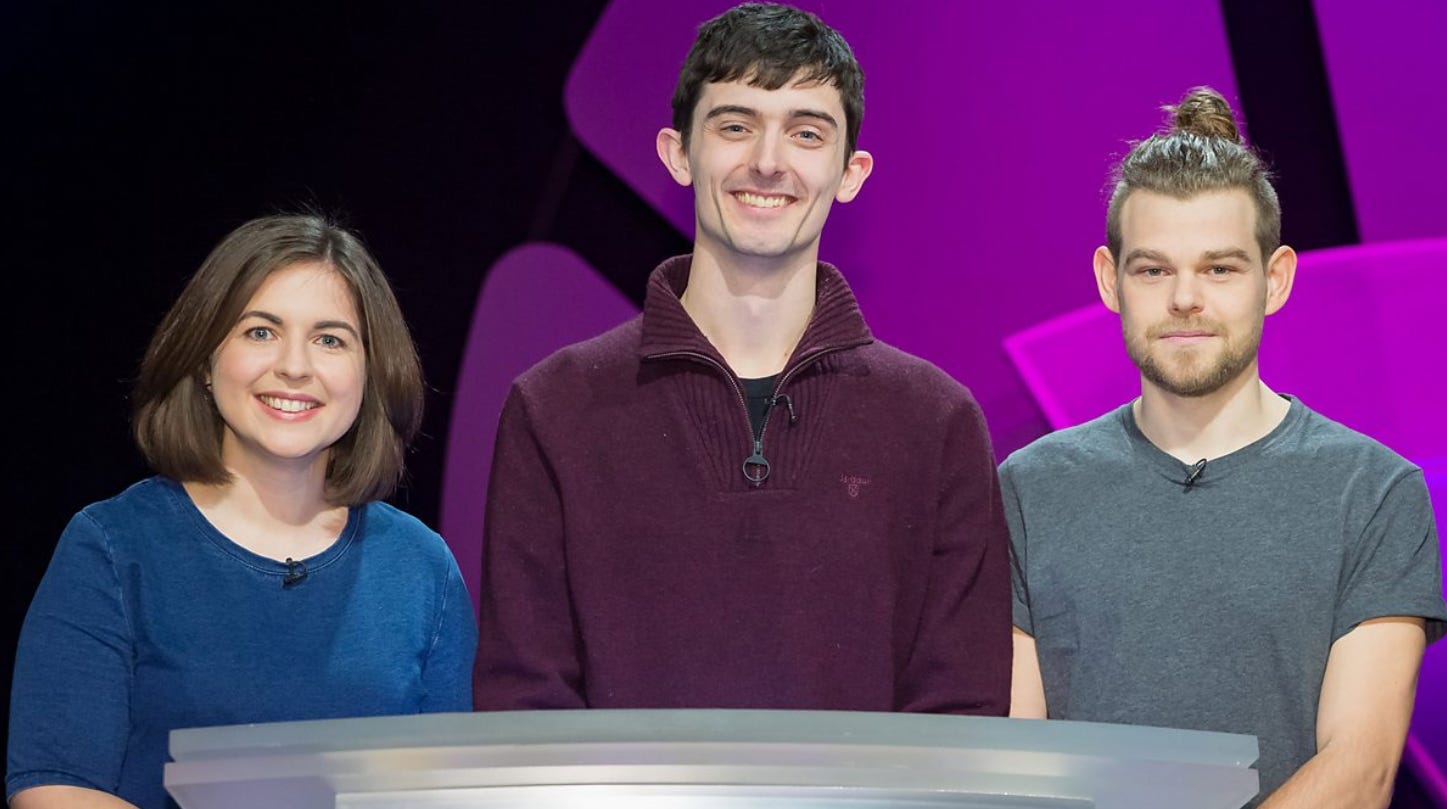
I really ought to be in a Deep Reading Phase (DRP) at the moment, rather than trying to do too much Active PhD Stuff (APS?) while my first survey is hopefully soon looked over by my university’s ethics committee. To enable a full DRP™️, I’ve been thinking about how to make more time for delightful, dense academic texts in my evenings.
What could I cut down on a bit (as well as doomscrolling, obviously… sigh)? Telly, for instance. What do I spend time watching regularly? I’ve done the first series of Slow Horses recently and will go back for more. I do like watching quizzes on a Monday evening (have I ever mentioned I was on Only Connect? Surely not. Doesn’t sound like me).

But what’s the one TV show I could reliably watch day in, day out, whatever mood I might be in prior? What’s the show that, despite a very VERY similar formula, over several formats, repeated year after year after year, allows for predictable viewing and therefore a surprisingly soothing balm when one needs to wind down at the end of a long day?
I wish the answer was something cooler, but it’s Masterchef.
Some form of Masterchef is broadcast in the UK over 21 weeks, or 63 days, in every year. All permutations are currently available on iPlayer: Celebrity Masterchef; Masterchef: The Professionals; normal Masterchef, where really good amateurs with inexplicably large kitchens are already not far off restaurant level cooking at the beginning of the competition. (The only exception to this unstoppable march on our - fine, my - screen habits is Young Masterchef, which I am treating as an anomaly in my data set because it’s not aimed at adults and has a completely different presenting line-up. The idea that there is yet another series with that word in the title that we could all hook ourselves onto is… challenging.)
I have watched every single UK episode of Celebrity, Professional and the original format for roughly the past 10 years, which I think gives me enough qualification to attempt a mini discourse analysis on what (I think) we’re watching.
I will never eat much of the food I observe on these shows. I will never go to most of the featured Michelin starred restaurants and witness the foam-covered, tweezer-garnished micro-portions for myself. I will probably never meet Gregg Wallace, even though I apparently spend 63 days of each year with some time during the afternoon or evening focused on his glowing visage.
So this is where my Therapist Brain kicks in: What’s going on with that, then? Well for one thing, the power dynamics are interesting to observe, both on screen and in my home…
How each person speaks tells you a lot about how the show would like you to receive them
Wallace and his fellow presenter-judges deliver statements with unnatural-sounding pauses while stood at jaunty angles, never looking directly down the lens or possibly even at each other (a good example is the quintessential Wallace-ism: “Cooking. Doesn’t get tougher. Than THIS.”). When critiquing a contestant’s efforts while they’re still cooking, Wallace or John Torode (let’s remain within original Masterchef for this section) will be taken aside and encouraged to mutter still a statement, but sotto voce and with urgency: “If they don’t get that pie in the oven in the next two minutes it won’t be cooked in time!”
They are presented as The Experts, with unshakeable confidence and experience. Their statement-making still remains when judging (mostly) finished dishes, but with the added frisson of needing superfluous adjectives to make sure the audience understands what is being eaten (while still never looking to camera and actually acknowledging the audience at any point, perhaps to keep on with the impression of Holding Immutable Power). That’s ok when describing Italian food for example, familiar to both judges and watching audience. It also helps that both Wallace and Torode seem to have a tolerance for spicy food well beyond the average British palate.
It’s much less fine, however, when judging food well outside of their cultural wheelhouses, like the time a Malaysian contestant was eliminated for cooking chicken rendang using her usual method even though it meant her chicken skin wasn’t crispy. While the judges can’t be expected to know every world cuisine culture intimately, if the programme makers know a Malaysian contestant is going to take part, wouldn’t having a Malaysian consultant or researcher on hand eliminate similar judging pitfalls? It’s like when Bake Off did Mexican week. Significant ick.
Torode in particular has done a bit of travelling and seemingly more research in recent times, so these segments in contemporary series mostly feel less cringeworthy. It seems telling, though, that guest judges are not used whenever primary knowledge of a certain culture is needed. What would happen if Torode and Wallace ceded some power, enabling space for guest judges beyond the narrow parade of restaurant critics periodically invited on?
Cut to the contestants, who are allowed the space to reel off the titles of their dishes with confidence, but with qualifiers (“Today I’m making for you…”), signalling their deference to those who will deem their food worthy of progression in the competition or not. When pressed for comments away from the prowling judges, voices raise in pitch and volume, sentences become deconstructed and can be phrased like questions, much like how we might talk to a friend when feeling nervous. Lynne from Series 12 provides a classic example by starting confidently - “My dish is simple, however it tastes good,” - but then, after a pause - “It does! Well, my husband says it does!” with shrinking of the shoulders and apologetic facial expression to boot.
The standards needed are wildly different, sometimes from episode to episode
The terror of the Masterchef: The Professionals Skills Test is well documented, but how can the judges ensure fairness when asking some chefs to make a croque monsieur (therefore demonstrating their knowledge of… a bechamel sauce, which I think I learned in Year 7 Food Technology) versus the poor contestants who had to safely prepare a sea urchin? The Professional outfit isn’t like the other two amateur gigs where everyone essentially is having a bit of fun; this is people’s livelihoods. Their careers could advance or flop, such is the cultural clout of this godforsaken show. Heaven forfend the nervous young chef prepping a razor clam, possibly for the first time ever, recorded for national television and saved for repeated viewings years later.
At this point, as one of the longest serving presenter-judge double-head behemoths, Wallace has been a key gatekeeper of progression both into and promotion within the high-level culinary industry for 19 years. Much like junior doctors or trainee music therapists, Masterchef contestants need to show a good level of competence right from the beginning (and in the Professionals’ case are already responsible for paying customers who want to eat and enjoy their food and the performance around it). Simultaneously, they’re in the vulnerable position of needing to perform to a good enough level - and in the way the judges think is most appropriate - to stand a chance of receiving the opportunity for career advancement that could quite literally change their lives. Or, you know, hang up their apron and scrub themselves from the nation’s screens. A chocolate fondant that doesn’t ooze in the middle (or oozes too much) always seems like too much of a silly risk to me.
There’s got to be an unconscious acknowledgement that there’s a power difference between the people on TV and the watching audience for it to work
Perhaps this is why the Celebrity version is more anarchic but ultimately less enjoyable. The best filler TV is escapist; I enjoy watching high-end food being prepared that I cannot smell or taste much more if I’m having a really simple dinner like beans on toast at the same time. I can pretend I can do what the people on telly can do while eating something that I prepared myself but is arguably just as satisfying. Until you get to the latter half of the series, where the remaining celebrities can actually cook, my level of skill is not dissimilar to the people I’m seeing in the competition.
Sometimes, the celebrity contestants especially will briefly look to camera - less to acknowledge the watching audience, perhaps (who are not watching while the show is being filmed), more to better demonstrate their vulnerability, through a pulled face or panicked expression. A celebrity, usually, has some social clout and power through virtue of their elevated position; here, they remain exposed, enabled to be judged, lowering themselves for the course of the episode back down to mere prole (although, if you’re Marx, perhaps this is a deliberate ploy to retain some power).
Some people enjoy the schadenfreude of someone given a national platform who then royally messes up on the telly. I guess there’s the sensation of feeling like some of the power has come back to those watching at home. Others prefer watching someone grow in skill and confidence, just like Bill Bailey learning to dance. Here, the dynamic is enjoyably stretched and played with, along with the sensation that the triumphant celebrity (a word that has increasingly snobby implications with the advancement of reality stars and other people perceived to have clout without corresponding talent) has finally earned their elevated position of winner on merit.
The problem is, you also never get the highs of watching someone genuinely exceptional at their craft produce something mind blowing. The celebrity, while elevated and noteworthy, also in contemporary society must be relatable enough that we want to root for them. That, unfortunately, relies on the audience knowing who the celebrities are in advance of the show, which sometimes is possible…
So… what have we learned from all this?
Incredible as it is to have written an article on Masterchef and not even mentioned both Marcus Wareing and Monica Galetti (let alone Mr Albert Bartlett himself, Michel Roux Jr), perhaps this signals there is yet more that could be written. As a microcosm of societal power dynamics, all three shows advocate for markers of progression solely on talent and skill, which we know is not what actually happens in the real world.
Could it be that Masterchef is borne out of an idea of a meritocratic utopia, where nepo babies haven’t completely taken over the acting world and any child that wants to can have access to musical instrument lessons (and their parents to limitless earplug supplies while darling Cecily masters Old MacDonald on the violin)? Where food in high-end kitchens is made purely from love, all is delicious to eat and foams only exist on the plate for good, explainable reason? Will there still be space for John and Gregg at the table in this new world order?
Much to percolate. Let me come back to those thoughts once I’ve got my chocolate fondant out of the oven. It’s due out in 30 seconds from now. I do hope it’s molten in the middle.



